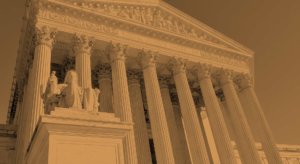February may be the shortest month, but there were still significant employment law developments, including the nomination of a Supreme Court Justice and a landmark lawsuit against the NFL. Read the details below.
President Biden nominates Judge Ketanji Brown Jackson to the U.S. Supreme Court
Confirming what has been rumored since Justice Breyer announced his retirement, federal appeals court Judge Ketanji Brown Jackson was officially nominated to potentially serve as the first African American woman on the U.S. Supreme Court. Below are a pair of employment law decisions that may foreshadow what Justice Jackson’s SCOTUS opinions may look like in the areas of unions and disability discrimination:
- In Fed’n of Gov’t Emps., AFL-CIO v. Trump, 318 F. Supp. 3d 370 (D.D.C. 2018), the American Federation of Government Employees (“AFGE”) and numerous other federal employee unions brought challenges to three of President Trump’s executive orders on collective bargaining rights of federal workers. The unions argued that the orders exceeded the president’s powers and conflicted with both federal labor laws and the employees’ constitutional rights. In a lengthy opinion, Jackson ruled for the union challengers. She agreed with them both that she had the power to review their claims and that President Trump’s “directives undermine federal employees’ right to bargain collectively as protected by” federal law. Notably, the D.C. Circuit reversed Jackson’s holding that she had the power to review the union’s claims. The unions, Judge Thomas Griffith reasoned, must first pursue their challenge through an administrative agency process and then, if necessary, in the courts of appeals.
- In Pierce v. District of Columbia, 128 F. Supp. 3d 250 (D.D.C. 2015), Jackson ruled that prison employees and contractors in the District of Columbia had discriminated against William Pierce, a deaf man serving a 2-month sentence for assault, when they failed to take any action to determine what accommodations he would need to communicate with others and “largely ignored his repeated requests for an interpreter.” Jackson found that the plaintiff “easily satisfe[d]” the “deliberate indifference” standard under Title II [applicable to prison officials] . . . where “[t]he District’s employees and contractors knew that [the plaintiff] had a hearing disability, and yet they did not undertake an assessment of the accommodations that [he] might need in order to access prison services”. Instead, the employees and contractors “figuratively shrugged and effectively sat on their hands with respect to this plainly hearing-disabled person in their custody, presumably content to rely on their own uninformed beliefs about how best to handle him and certainly failing to engage in any meaningful assessment of his needs.” A jury later awarded Pierce $70,000 in damages, and the city did not appeal.
Former Miami Dolphins Head Coach Sues NFL alleging Systemic Racial Bias
Earlier this month, former Miami Dolphins Head Coach Brian Flores filed a proposed class action lawsuit seeking to represent African American coaches and general managers passed over the NFL hiring process. Flores had back-to-back winning seasons with the Miami Dolphins before his recent termination this January. Following his termination, Flores was set to interview for an open head coaching position with the New York Giants when he found out through a text message that another Caucasian candidate had already been selected for the role. Flores nevertheless went through the interview process, which he considered a sham and being conducted only for appearances under the NFL’s “Rooney Rule”, which requires teams to interview minority candidates for open head coaching jobs.
The lawsuit highlights the significant labor vs. management paradigm in the NFL between the largely minority players and the largely Caucasian ownership and coaching staffs. Among other things, the suit points out that, despite the fact that the NFL player pool is 70% African American, only 1 NFL team currently employees an African American head coach. Multiple high-profile NFL representatives are identified as potential witnesses, including New England Head Coach Bill Belichick, who sent the text message that alerted Flores to his losing out on the New York position, and Hall of Fame Quarterback-turned-GM John Elway, who was allegedly involved in another sham interview of Flores, allegedly arriving to a Flores job interview an hour late looking “disheveled” and making it “obvious” he and others had been drinking heavily the night before.
Many headlines will likely be forthcoming. The case is Flores v. The National Football League et al., case number 1:22-cv-00871, in the U.S. District Court for the Southern District of New York.
Jeff Burke is an attorney at MacElree Harvey, Ltd., working in the firm’s Employment and Litigation practice groups. Jeff counsels businesses and individuals on employment practices and policies, executive compensation, employee hiring and separation issues, non-competition and other restrictive covenants, wage and hour disputes, and other employment-related matters. Jeff represents businesses and individuals in employment litigation such as employment contract disputes, workforce classification audits, and discrimination claims based upon age, sex, race, religion, disability, sexual harassment, and hostile work environment. Jeff also practices in commercial litigation as well as counsels business on commercial contract matters.




